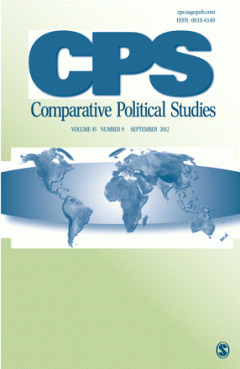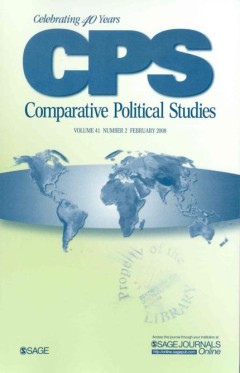Filter by

Is Chávez Populist?: Measuring Populist Discourse in Comparative Perspective
This article pushes forward our understanding of populism by developing one of the more underappreciated definitions of populism, populism as discourse. It does so by creating a quantitative measure of populist discourse suitable for cross-country and historical analysis. The article starts by laying out the discursive definition of populism in the context of existing definitions. It then opera…
- Edition
- Volume 42, Number 8, August 2009.pp. 1040-1067
- ISBN/ISSN
- 0010-4140
- Collation
- -
- Series Title
- Comparative Political Studies
- Call Number
- -

Enough!: Egypt's Quest for Democracy
In 2004-2005, for the first time in more than five decades, Egypt witnessed the rise of a protest movement calling for the end of one-party rule. In 1 year, Egypt witnessed more oppositional demonstrations, rallies, and the organization of nonviolent dissident groups than it has seen in the previous 25 years. However, the outcome of this mobilization in terms of democratic opening remained limi…
- Edition
- Volume 42, Number 8, August 2009. pp. 1011-1039
- ISBN/ISSN
- 0010-4140
- Collation
- -
- Series Title
- Comparative Political Studies
- Call Number
- -

Context and Causal Mechanisms in Political Analysis
Political scientists largely agree that causal mechanisms are crucial to understanding causation. Recent advances in qualitative and quantitative methodology suggest that causal explanations must be contextually bounded. Yet the relationship between context and mechanisms and this relationship's importance for causation are not well understood. This study defines causal mechanisms as portable c…
- Edition
- Volume 42, Number 9, September 2009. pp. 1143-1166
- ISBN/ISSN
- 0010-4140
- Collation
- -
- Series Title
- Comparative Political Studies
- Call Number
- -

The Regulation of Transnational Corporate Identity in Europe
Rules governing the corporate identity of multinational companies are national in nature, with the one exception of the European Company Statute. For the first time in the history of capitalism, this statute enables companies to jettison national rules of incorporation in favor of an international legal identity. This article explains why the statute was the most protracted legislative initiati…
- Edition
- Volume 42, Number 9, September 2009. pp. 1167-1192
- ISBN/ISSN
- 0010-4140
- Collation
- -
- Series Title
- Comparative Political Studies
- Call Number
- -

The Politics of Exchange Rate—Based Stabilization Versus Structural Reforms…
In the 1990s, the choice of an appropriate exchange rate regime began to capture the attention of policy makers across Latin America. Several countries pegged their currency to the U.S. dollar or even officially substituted the dollar for their national currency. Although economists and political scientists have made piecemeal contributions to the understanding of such policy choices, the liter…
- Edition
- Vol. 42, No. 9, September 2009
- ISBN/ISSN
- 00104140
- Collation
- -
- Series Title
- Comparative Political Studies
- Call Number
- -

Political and Institutional Checks on Corruption: Explaining the Performance …
This article investigates the performance determinants of accountability institutions in new democracies. Current scholarship on accountability has identified a distinct mechanism through which the introduction of political competition may affect such institutions: the electoral connection or vertical accountability mechanism. This connection is not expected to be effective in new democracies, …
- Edition
- -
- ISBN/ISSN
- 00104140
- Collation
- -
- Series Title
- Comparative Political Studies
- Call Number
- -

Speak Clearly and Carry a Big Stock of Dollar Reserves: Sovereign Risk, Ideol…
Partisan theories of political economy expect that bondholders will panic with the election of a left-wing presidential candidate. The latter seems to be what happened in Brazil in the 2002 presidential elections. However, quantitative analysis of perceptions of sovereign credit risk in Argentine, Brazilian, Mexican, and Venezuelan presidential elections from 1994 until 2007 shows no real evide…
- Edition
- Volume 42, Number 10, October 2009.pp. 1292-1316
- ISBN/ISSN
- 0010-4140
- Collation
- -
- Series Title
- Comparative Political Studies
- Call Number
- -

Voter Turnout in Presidential Democracies
Numerous studies indicate that political institutions play an important role in explaining variation in voter turnout across countries. The nuances of institutions unique to presidential elections have been largely overlooked, however, despite the different incentives they offer for voters to participate in elections. This article examines the effect that four presidential institutions had on v…
- Edition
- Volume 42, Number 10, October 2009.pp. 1317-1338
- ISBN/ISSN
- 0010-4140
- Collation
- -
- Series Title
- Comparative Political Studies
- Call Number
- -

Patronage and Political Stability in Africa
Political conflict across Africa is often linked to the pervasive use of patronage in retaining control of the state. However, few sources of data have been available to systematically examine the relationship between a leader�s patronage strategies and the likelihood of an extraconstitutional change in power. This article employs ministerial appointments to the cabinet as a proxy for changes i…
- Edition
- Volume 42, Number 10, October.pp. 1339-1362
- ISBN/ISSN
- 0010-4140
- Collation
- -
- Series Title
- Comparative Political Studies
- Call Number
- -

Tomorrows Leaders?: Understanding the Involvement of Young Party Members in S…
Using a mass survey of young members of 15 parties in six European democracies, this article explores their motivations, perceptions, attitudes, and behavior. In a context of general disenchantment with politics and febrile participation, particularly among young citizens, this article explains why a large number of youngsters still decide to get involved in one of the most traditional forms of…
- Edition
- Volume 42, Number 10, October 2009.pp. 1259-1290
- ISBN/ISSN
- 0010-4140
- Collation
- -
- Series Title
- Comparative Political Studies
- Call Number
- -

Electoral Protests and Democratization Beyond the Color Revolutions
The sight of thousands of people demonstrating for clean elections and an end to corrupt postcommunist regimes led many observers to declare that the so-called color revolutions had finally brought democracy to Serbia, Georgia, Ukraine, and Kyrgyzstan. But how successful have these electoral revolutions actually been? The authors analyze all cases of electoral revolutions worldwide since 1991, …
- Edition
- Vol. 42, No. 11, November 2009.pp. 1403-1425
- ISBN/ISSN
- 0010-4140
- Collation
- -
- Series Title
- Comparative Political Studies
- Call Number
- -

Democratization as Deliberative Capacity Building
Effective deliberation is central to democracy and so should enter any definition of democratization. However, the deliberative aspect now ubiquitous in the theory, practice, and promotion of democracy is generally missing in comparative studies of democratization. Deliberation capacity can be distributed in variable ways in the deliberative systems of states and other polities. A framework is …
- Edition
- Vol. 42, No. 11, November 2009.pp. 1379-1402
- ISBN/ISSN
- 0010-4140
- Collation
- -
- Series Title
- Comparative Political Studies
- Call Number
- -

The Politicized Participant: Ideology and Political Action in 20 Democracies
Modern liberal democracies demand high and equal levels of political action. Unequal levels of political action between ideological groups may ultimately lead to biased policy. But to what extent do citizens� ideological preferences affect their likelihood to participate politically? And does the institutional environment moderate this relationship? From rivaling theories, the authors construct…
- Edition
- Vol. 42, No. 11, November 2009.pp. 1426-1457
- ISBN/ISSN
- 0010-4140
- Collation
- -
- Series Title
- Comparative Political Studies
- Call Number
- -

Technology and the Evolution of the Regulatory State
Modern states increasingly rely on two means of regulating markets: public regulation (by the government) and private self-regulation (by the firms themselves). This study assesses the evolution of the state toward co-regulation by examining, across countries, the incidence of a prominent type of self-regulation: the environmental protection standard ISO 14001. It focuses on technological capab…
- Edition
- Vol. 42, No. 12, December 2009. pp. 1567-1590
- ISBN/ISSN
- 0010-4140
- Collation
- -
- Series Title
- Comparative Political Studies
- Call Number
- -

Time Bomb? The Dynamic Effect of News and Symbols on the Political Identity o…
Based on a three-wave, six-country comparative panel study experiment with 1,197 participants, this article shows how in the long term, political institutions and the media can affect the European identity of citizens. It shows not only that exposure to good or bad news on Europe and to symbols of the European Union has an effect on European identity but also that news works as a powerful time …
- Edition
- Vol. 42, No. 12, December 2009.pp. 1498-1536
- ISBN/ISSN
- 00104140
- Collation
- -
- Series Title
- Comparative Political Studies
- Call Number
- -

Crafting Trust: The Role of Political Institutions in a Comparative Perspective
In this article, the authors evaluate the origins of generalized trust. In addition to examining individual-level determinants, the analytic focus is on the political-institutional context. In contrast to most of the analyses to date, the authors conduct hierarchical analyses of the World Values Surveys (1995-1997 and 1999-2001) to simultaneously test for differences among respondents in 58 cou…
- Edition
- Vol. 42, No. 12, December 2009.pp. 1537-1566
- ISBN/ISSN
- 0010-4140
- Collation
- -
- Series Title
- Comparative Political Studies
- Call Number
- -

The Ideological Congruence Controversy: The Impact of Alternative Measures, D…
Focusing on the left-right scale as a summary measure of citizens� and representatives� preferences, a growing body of literature has used a variety of approaches and data in measuring positions of citizens and representatives. The most recent studies, contrary to previous ones, show no significant difference between ideological congruence in single member district (SMD) and proportional repres…
- Edition
- Vol. 42, No. 12, December 2009.pp. 1475-1497
- ISBN/ISSN
- 0010-4140
- Collation
- -
- Series Title
- Comparative Political Studies
- Call Number
- -

Bargaining Delays in the Government Formation Process
In parliamentary democracies, the transfer of power from one government to the next is sometimes characterized by long periods of negotiations in which party leaders bargain over the composition and policy objectives of a new cabinet. Although these delays can have substantial political and economic consequences, surprisingly little is known about their determinants. Moreover, the few studies t…
- Edition
- Vol. 43, No. 1, Jan. 2010. pp. 3-32
- ISBN/ISSN
- 00104140
- Collation
- -
- Series Title
- Comparative Political Studies
- Call Number
- -

Comparing Strategic Voting Under FPTP and PR
Based on recent work that suggests that voters in proportional representation (PR) systems have incentives to cast strategic votes, the authors hypothesize that levels of strategic voting are similar in both first-past-the-post (FPTP) and PR systems. Comparing vote intentions in majoritarian elections in the United States, Mexico, Britain, and Israel to PR elections in Israel and the Netherland…
- Edition
- Vol. 43, No. 1, Jan. 2010. pp. 61-90
- ISBN/ISSN
- 00104140
- Collation
- -
- Series Title
- Comparative Political Studies
- Call Number
- -

Do Migrants Remit Democracy? International Migration, Political Beliefs, and …
International migrants are agents of democratic diffusion. They spread attitudes and behaviors absorbed in democratic host countries to their less democratic home countries by way of three processes: (a) migrant returns, (b) cross-border communication between migrants still abroad and their friends and family back home, and (c) migrant information networks in high-volume migration-producing com…
- Edition
- Vol. 43, No. 1, Jan. 2010. pp. 119-148
- ISBN/ISSN
- 00104140
- Collation
- -
- Series Title
- Comparative Political Studies
- Call Number
- -
 Computer Science, Information & General Works
Computer Science, Information & General Works  Philosophy & Psychology
Philosophy & Psychology  Religion
Religion  Social Sciences
Social Sciences  Language
Language  Pure Science
Pure Science  Applied Sciences
Applied Sciences  Art & Recreation
Art & Recreation  Literature
Literature  History & Geography
History & Geography